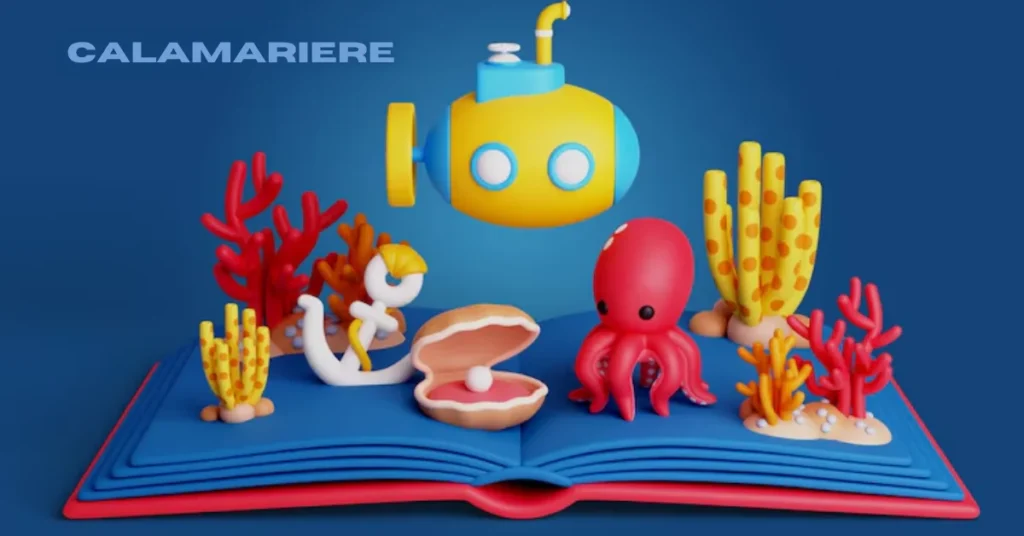🦑 Introduction
Ever heard a word that immediately tickled your tastebuds and sparked your imagination? “Calamariere” is one of those rare gems. A poetic hybrid that hints at the sea’s bounty, the elegance of culture, and the artful world of gastronomy — it’s a word that feels as delicious as it sounds.
But where did it come from? And why does it feel like it belongs in a five-star menu or whispered by a sommelier on the Amalfi Coast? Let’s dive deep into the sensual, savory story behind this irresistible word.
🌊 Etymology and Linguistic Roots
A Name Inspired by the Sea
At first glance, “calamariere” seems like a relative of calamari, the beloved squid dish. And you’d be right. But there’s more to it than that — it’s a clever coinage that marries food, culture, and flair.
Latin and Italian Influences
The root “calamari” stems from the Latin calamarius, meaning “pertaining to a pen,” nodding to the squid’s ink. In Italian, it transformed into “calamaro,” and then “calamari,” the plural form. It naturally evokes the Mediterranean — warm waves, bustling harbors, and beachside trattorias.
Evolution in Culinary Language
Now, blend that with “-iere” — a suffix borrowed from French (like “chocolatier”) and Italian (“cavaliere”) — and you’ve got a word that implies mastery, artistry, and identity. That’s how “calamariere” is born: a maestro of the mollusk.
🍽️ Calamari: The Culinary Muse
A Global Seafood Favorite
Whether fried, grilled, or braised in wine, calamari is universally loved. In Spain, it’s tapas. In Korea, it’s spicy ojingeo. In Greece, it’s drizzled with lemon and olive oil. And in Italy? It’s romance on a plate.
Different Styles of Cooking Calamari
- Fried calamari – crispy, golden, and served with aioli.
- Stuffed calamari – hearty with breadcrumbs, herbs, and cheese.
- Squid ink pasta – dramatic and decadent.
- Calamari stew – rich and warming, perfect for cool evenings.
Mediterranean vs. Asian Approaches
Mediterranean cuisine elevates calamari through simplicity — a squeeze of citrus, a brush of olive oil. Asian styles highlight bold spices, fermentation, and dynamic textures.
🎨 The “iere” Suffix: A Symbol of Craft and Art
What Does “-iere” Signify?
Think chocolatier, sommelier, cavalier — all words that bestow expertise and charm. “-iere” says, “I don’t just cook it. I craft it. I live it.”
Similar Linguistic Examples
- Fromage → Fromagier
- Charcuterie → Charcutier
- Bouquet → Bouquetiere
“Calamariere” fits this family. It’s not just about food — it’s about being the artisan behind the flavor.
🍷 Fusion of Flavor and Language
Why “Calamariere” Feels Right
Because language is flavor, too. Just like how a good sauce pulls a dish together, a good word pulls emotion and meaning into alignment.
Culinary Terms as Cultural Mirrors
Words like “gastronomy,” “confit,” “umami” — they’re cultural capsules. “Calamariere” joins them as a rich reflection of a globally inspired palate.
👃 The Rise of Experiential Dining
Language as Part of the Experience
Today’s diners don’t just want food — they want stories. The term “calamariere” creates anticipation and allure, like a whisper of something exotic before the plate arrives.
Sensory Branding in Food Culture
It’s no longer about what’s on the menu — it’s how the menu feels, sounds, and reads. Calamariere stands as a shining example of branding through linguistics.
🍤 Calamariere in Modern Gastronomy
Emerging in Seafood Menus
From pop-ups to Michelin-star restaurants, we’re starting to see invented titles like calamariere. It implies prestige — someone who handles squid with the elegance of a sculptor.
Embraced by Fine Dining Chefs
Chefs are storytellers. And words like “calamariere” empower them to narrate their oceanic adventures with elegance.
🌊 Calamariere and the Oceanic Identity
Evoking Marine Elegance
There’s a romanticism to the sea. “Calamariere” taps into that — a blend of brine, salt spray, and sun-kissed tables by the coast.
Sustainability and Sea-to-Table Concepts
Modern diners are conscious. The calamariere isn’t just about cooking squid — it’s about knowing where it came from, and respecting the ocean it came from.
🎨 Visual and Emotional Aesthetics
Word Imagery and Emotion
Say “calamariere” out loud. Feel the syllables. It’s silky. It’s chic. It evokes texture, tone, and taste — all at once.
The Art of Naming Dishes
Menus are canvases. And the right word turns a dish into a masterpiece before a single bite is taken.
📖 The Culture of Naming in Culinary Arts
How Names Shape Perceptions
A dish called “Grilled Squid” sounds plain. Call it “Calamariere’s Special” — suddenly, it’s storytelling on a plate.
Gastronomic Storytelling
Food is a universal language. And names like “calamariere” let us write chapters of culture through cuisine.
🏷️ Case Studies: Restaurants Using ‘Calamariere’
Menu Designs and Branding
Upscale seafood spots have begun using “calamariere” as a title for their chefs or a signature dish. It’s fresh, intriguing, and memorable.
Interviews with Chefs
Many chefs share that naming their dishes with creative titles like “calamariere” brings emotional connection and intrigue to their customers.
📲 Social Media and Culinary Trends
Hashtags and Food Identity
#Calamariere is catching on. It’s Instagrammable, hashtag-worthy, and adds personality to posts.
Instagram-Worthy Linguistics
A visually stunning plate needs a name to match. And “calamariere” delivers — visually, emotionally, and phonetically.
🧠 The Sensory Journey
Taste, Smell, Sound, and Texture
“Calamariere” isn’t just a word. It’s a flavor symphony, a call to all five senses. You imagine the sizzle, the sea breeze, the aroma of garlic and lemon.
A Multisensory Experience in a Single Word
It’s rare for one word to taste like the sea and sound like poetry. But “calamariere” nails it.
💼 Beyond the Plate: Calamariere as a Brand
Merchandise, Cookbooks, and More
Don’t be surprised if you see “Calamariere” on an apron, a food memoir, or a high-end kitchen tool line. It has all the ingredients of a successful brand.
The Word as a Lifestyle Statement
Much like “foodie,” “barista,” or “gourmand,” a “calamariere” could become a lifestyle — someone who lives and breathes the beauty of seafood.
🔮 The Future of Words Like Calamariere
Culinary Linguistics in the Digital Age
The fusion of AI, creativity, and culinary arts means new words will emerge — and “calamariere” is just the beginning.
AI, Food Innovation, and Language Evolution
As we evolve in taste, tech, and storytelling, words like “calamariere” will be at the intersection of language and innovation.
🌟 Conclusion
“Calamariere” isn’t just a fancy word — it’s a passport to the sea, a whisper of culture, and a love letter to cuisine. It’s where language meets flavor, and storytelling stirs the senses. So the next time you hear it, don’t just think squid. Think art, think elegance, think experience.






